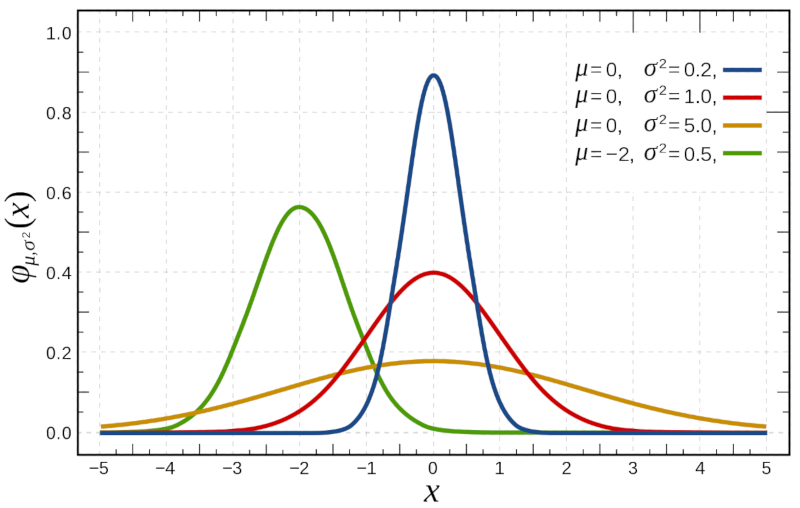Gaussian distribution
Storyboard 
In the limit of similar probabilities the binomial distribution is reduced in the continuous limit to the Gaussean distribution.
ID:(1556, 0)
Example comparison with Gaussian distribution
Definition 
If we study the binomial distribution for large numbers
| $P(x)=\displaystyle\frac{1}{\sqrt{2\pi\sigma^2}}e^{-(x-\mu)^2/2\sigma^2}$ |
which is represented below:

ID:(7793, 0)
Gaussian distribution
Description 
In the limit of similar probabilities the binomial distribution is reduced in the continuous limit to the Gaussean distribution.
Variables
Calculations
Calculations
Equations
(ID 8973)
(ID 9008)
Examples
Con la probabilidad de que se de un numero definido de pasos a la derecha e izquierda esta dada por
| $W_N(n_1,n_2)=\displaystyle\frac{N!}{n_1!n_2!}p^{n_1}q^{n_2}$ |
con el n mero total de pasos es
| $N=n_1+n_2$ |
y solo existe la probabilidad de ir a la derecha o a la izquierda, con se tiene para las probabilidades que
| $p+q=1$ |
por lo que con se tiene la distribuci n binomial
| $ W_N(n) =\displaystyle\frac{ N !}{ n !( N - n )!} p ^ n (1- p )^{ N - n }$ |
(ID 8961)
With the Stirling approximation
equation=8966
and the change of variables
equation=8996
you get that
equation
(ID 8998)
With the Stirling approximation
equation=8966
and the change of variables
equation=11431
you get that
equation
(ID 9003)
With the Stirling approximation
equation=8966
and the change of variables
equation=8997
the expression is
equation
(ID 8999)
In the case of medium probabilities (
| $N!\sim\sqrt{2\pi N}\left(\displaystyle\frac{N}{e}\right)^N$ |
| $n!\sim\sqrt{2\pi n}\left(\displaystyle\frac{n}{e}\right)^n$ |
and
| $(N-n)!\sim\sqrt{2\pi(N-n)}\left(\displaystyle\frac{N-n}{e}\right)^{N-n}$ |
is obtained
| $\displaystyle\frac{N!}{n!(N-n)!}\sim\displaystyle\frac{1}{\sqrt{2\pi N}}\left(\displaystyle\frac{n}{N}\right)^{-n-1/2}\left(\displaystyle\frac{N-n}{N}\right)^{-N+n-1/2}$ |
(ID 507)
The expression
| $ W_N(n) =\displaystyle\frac{ N !}{ n !( N - n )!} p ^ n (1- p )^{ N - n }$ |
is reduced by
| $\displaystyle\frac{N!}{n!(N-n)!}\sim\displaystyle\frac{1}{\sqrt{2\pi N}}\left(\displaystyle\frac{n}{N}\right)^{-n-1/2}\left(\displaystyle\frac{N-n}{N}\right)^{-N+n-1/2}$ |
to representation
| $W_N(n)\sim\displaystyle\frac{1}{\sqrt{2\pi N}}\left(\displaystyle\frac{n}{N}\right)^{-n-1/2}\left(\displaystyle\frac{N-n}{N}\right)^{-N+n-1/2}p^n(1-p)^{N-n}$ |
(ID 506)
If total
| $\mu=aNp$ |
(ID 9008)
To obtain the Gaussian distribution it is necessary to develop the distribution around its deviation from its mean position that can be given by
| $x=(n-Np)a$ |
(ID 8973)
As the way is
| $x=(n-Np)a$ |
factor
| $\displaystyle\frac{n}{N}=p\left(1+\displaystyle\frac{x}{aNp}\right)$ |
(ID 9004)
As the way is
| $x=(n-Np)a$ |
factor
| $\displaystyle\frac{N-n}{N}=(1-p)\left(1-\displaystyle\frac{x}{aN(1-p)}\right)$ |
(ID 9005)
If large numbers and probabilities around 1/2 are entered in the binomial distribution for the case
| $W_N(n)\sim\displaystyle\frac{1}{\sqrt{2\pi N}}\left(\displaystyle\frac{n}{N}\right)^{-n-1/2}\left(\displaystyle\frac{N-n}{N}\right)^{-N+n-1/2}p^n(1-p)^{N-n}$ |
the expressions
| $\displaystyle\frac{n}{N}=p\left(1+\displaystyle\frac{x}{aNp}\right)$ |
and
| $\displaystyle\frac{N-n}{N}=(1-p)\left(1-\displaystyle\frac{x}{aN(1-p)}\right)$ |
a distribution of the form is obtained
| $W_N(n)\sim\displaystyle\frac{1}{\sqrt{2\pi N}p(1-p)}\left(1+\displaystyle\frac{x}{aNp}\right)^{-n-1/2}\left(1-\displaystyle\frac{x}{aN(1-p)}\right)^{-N+n-1/2}$ |
(ID 8974)
To develop the
| $u=\displaystyle\frac{x}{aNp}$ |
(ID 9021)
With the approximation
| $1+u\sim e^{u-\frac{1}{2}u^2}$ |
it has to
| $\left(1+\displaystyle\frac{x}{aNp}\right)\sim e^{x/aNp-x^2/2a^2N^2p^2}$ |
(ID 9006)
To develop the factor
| $u=\displaystyle\frac{x}{aN(1-p)}$ |
(ID 9022)
With the approximation
| $1+u\sim e^{u-\frac{1}{2}u^2}$ |
it has to
| $\left(1-\displaystyle\frac{x}{aN(1-p)}\right)\sim e^{-x/aN(1-p)-x^2/2a^2N^2(1-p)^2}$ |
(ID 9007)
It can be shown that for a large number
| $P(x)=\displaystyle\frac{1}{\sqrt{2\pi N^2p(1-p)}}e^{-(x-aNp)^2/2N^2p(1-p)}$ |
In this case, the probability
(ID 3367)
$\begin{matrix}
P(x) & = & \displaystyle\frac{1}{\sqrt{2\pi\sigma^2}}e^{-(x-\mu)^2/2\sigma^2}\\
\sigma^2 & = & Np(1-p)\\
\end{matrix}
$
(ID 3368)
The standard deviation of the binomial distribution at the limit
| $ \sigma^2 = N ^2 p (1- p )$ |
(ID 8963)
If we study the binomial distribution for large numbers
| $P(x)=\displaystyle\frac{1}{\sqrt{2\pi\sigma^2}}e^{-(x-\mu)^2/2\sigma^2}$ |
which is represented below:

(ID 7793)
ID:(1556, 0)
